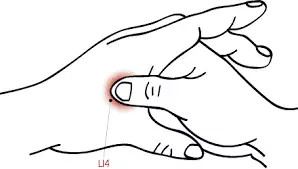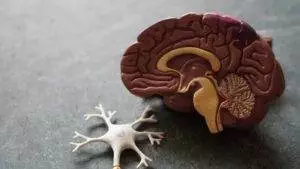-
 Art of Wellness Acupuncture & Traditional Chinese Medicine (TCM)11704 Wilshire Blvd, Suite 295, Los Angeles, CA, 90025
Art of Wellness Acupuncture & Traditional Chinese Medicine (TCM)11704 Wilshire Blvd, Suite 295, Los Angeles, CA, 90025
myartofwellness@gmail.com310-451-5522 Office Hours
MonClosedTue7:30 am --4 pmWed7:30 am --4 pmThu7:30 am -- 4 pmFri7:30 am -- 4 pmSat7:30 am -- 4 pmSunClosedOur office opens from Tuesdays to Saturdays 7:30 am to 4 pm, will be closed on Memorial day, Independent day, Labor day, Thanksgiving day, Christmas and New year.
-
Recent Posts
- How to Treat Dysautonomia With Acupuncture and TCM
- How to Treat Myofascial Pain Syndrome With Acupuncture and TCM
- How to Treat Costochondritis With Acupuncture and TCM
- How to Treat Ankylosing Spondylitis With Acupuncture and TCM
- How to Treat Gastroparesis With Acupuncture and TCM
- How To Treat Sleep Apnea With Acupuncture and TCM
- How To Treat Baker’s Cyst With Acupuncture and TCM
- How to Treat Sinusitis With Acupuncture and TCM
- How To Treat Sjogren’s Disease With Acupuncture and TCM
- How to Treat Raynaud’s Syndrome With Acupuncture and TCM
- How to Treat Autoimmune Disorders With Acupuncture and TCM
- Chinese New Year 2024 Year of the Dragon
- Sign up to receive news and updates and get my free report:“The Top 10 Reasons to Try Acupuncture”

Migraines
How to Treat Headaches with Acupuncture and TCM
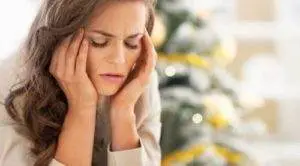
by Qineng Tan L.Ac., Ph.D. and Xiaomei Cai L.Ac., Ph.D.
Headaches are extremely common. Virtually everyone gets a headache occasionally. But many people experience chronic and/or severe headaches that regularly disrupt their lives. With acupuncture and TCM, it is possible to get to the root cause of your headache without relying on pain medications that only mask the problem and can cause side effects.
The first U.S. survey study to examine the prevalence of different types of headaches showed that about 4% of the general population suffers from chronic headaches (defined as experiencing headaches about 180 days per year – or half the time). Half of those surveyed demonstrated characteristics of tension-type headaches, while roughly a third met the criteria for migraines.
In fact, headaches are one of the conditions most commonly seen in acupuncture clinics today. TCM doctors using acupuncture can offer relief headache without the side effects that prescription and over-the-counter drugs can cause.
Headaches that can be treated with acupuncture include migraines, tension headaches, headaches occurring around the menstrual cycle, sinus headaches and stress-related headaches.
In this article, we will analyze the various types of headaches and their causes, discuss how they can be treated with acupuncture and TCM, demonstrate scientific evidence of the efficacy of those treatments, and offer some great tips for how you can prevent and manage headache pain with lifestyle modifications.
Seven Types of Headaches
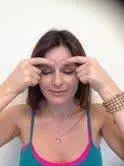
When treating with acupuncture, headaches are often classified by their location. This is only a broad guideline which needs to be further refined and integrated into the treatment for each individual, but this shows meridians and patterns that affect each area of the head.
- Top of Head: liver Meridian (Liver Blood Deficiency, Liver yang Rising)
- Sides of Head: Gall-Bladder Meridian (Liver-yang, Liver-Fire or Liver wind Rising)
- One Side Only: Gall-Bladder Meridian (Liver-Yang or Liver-Fire Rising)
- Temples: Gall-Bladder Meridian (Liver-Yang, Liver-Fire or Liver Wind Rising)
- Behind the Eyes: Liver Meridian (Liver Blood Deficiency, Liver Yang Rising)
- Forehead: Stomach Meridian (Stomach Deficiency or Stomach-Heat)
- Whole Head: Kidney-Essence Deficiency or External Wind
Many variables are taken into consideration in order to properly diagnose and successfully treat headaches. Each individual is treated differently depending on their unique symptoms.
Some of the factors that will determine what acupuncture points and other treatment techniques are used include: what triggers the headache; the location, frequency and intensity of the headaches; the quality of the pain; the time of day that they occur, what helps the headaches and what makes them worse.
What Causes a Headache?

A patient’s answers to the questions above help the TCM practitioner decide whether the headache stems from internal factors–such as emotions, hormone imbalance, PMS, lack of sleep or nutrition–or from external factors–such as toxins in the environment, pinching in the neck due to pillow positioning, or TMJ tension in the jaw. Occipital headaches occur when the occipital nerves in the back of the head and neck are irritated. The presenting symptoms, quality and location of the pain, also help to clarify whether there is a deficiency (tiredness) or an excess (feelings of anger). Often, there is a combination of various contributing factors, and the practitioner tailors the treatment to address them in concert.
Acupuncture and TCM Herbs for Headaches
Once the practitioner has determined the root causes of the headache, she will choose a combination of points to stimulate with acupuncture treatment. Many migraine headaches are associated with the liver, for example, so points might be chosen to cool yang fire in the liver. Tension-type headaches may be related to tension in the neck and shoulders, so the acupuncturist will work to release blockages in those areas. Usually, patients are encouraged to get two treatments per week for eight weeks.
Systematic reviews published by Cochrane in which the results of several scientific trials were consolidated demonstrate that acupuncture is an effective treatment for prevention and relief of
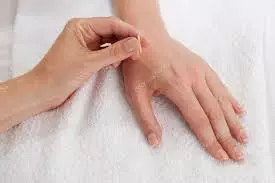
both tension-type headaches and migraines. They showed that patients receiving acupuncture treatment had on average about half as many headaches as those patients not receiving acupuncture. The results were also long-term, lasting for months beyond the cycle of treatment.
In addition to acupuncture treatment, the practitioner will likely recommend an herbal formulation that will address the patient’s specific needs. The daily use of the herb formula works to regulate the qi, balance yin and yang energies in the body, clear blockages and disperse stagnation. Studies have shown that consistent use of herbs over a period of several weeks can help significantly reduce headache pain.
Eight Self-Care Practices for Headache Prevention
Healthy habits can help prevent or reduce the frequency and severity of headaches. Focus on what you can do to “get ahead” of your headaches.
- Nutrition – Eat meals and snacks at regular times (every 3 hours or so) to maintain steady blood sugar levels. Avoid foods and drinks that are known to trigger headache attacks, including: processed meats, aged cheese, alcohol, and items sweetened with aspartame. Dehydration is a common cause of headaches; be sure to drink plenty of pure water throughout the day in addition to other liquids.
- Sleep – Establish and maintain a regular sleeping schedule – rising and retiring at about the same time each day – including weekends and vacations. Sleep needs vary from person to person; figure out how much is optimal for you, and then strive for that nightly.
- Stress – Stress is one of the most common headache and migraine triggers. Incorporate stress reduction techniques into your daily life. Set firm boundaries about taking on extra commitments, set aside time for meditation or other quiet activities that help you unwind and focus, such as knitting, reading, cooking – whatever brings you peace. Avoid screen time in the hour or two before bed, and establish a grounding morning routine that you practice before looking at email and rushing to get somewhere.
- Activity – Cardiovascular exercise stimulates the body to release endorphins, which are brain chemicals that improve mood and relieve stress. Walking or hiking in nature is a great choice. Gentle stretching exercises such as yoga can help you become aware of tensions and release them. Massage is also helpful.
- Acupressure points –For tension type headaches, try a pressure point called “Large Intestine 4.” This point is located between the thumb and forefinger. Apply firm pressure, squeezing deeply into the webbing there.

Acupressure point LI4 - Headache Diary – Keep a diary of when your headaches occur, along with any triggers, and share the information with your healthcare provider.
- See your healthcare provider – Make an appointment with your healthcare provider to specifically discuss your headache.
- Be a partner in your headache care – Be informed, be a participant in your treatment and be an advocate for your headache care.
Don’t let chronic headaches keep interfering with your life. Talk to your TCM provider, and get started on a treatment regimen that will help you live more days headache-free.
For more information, see our previous article about different types of headaches and triggers and this article about how acupuncture can treat migraines.
What is Multiple Sclerosis and How to Manage MS with TCM & Acupuncture
Multiples Sclerosis is autoimmune disease, Traditional Chinese Medicine & Acupuncture are very helpful to improve these condition.
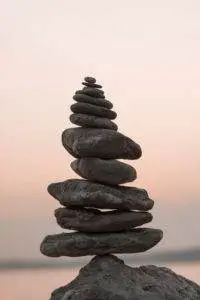
Dr.Tan’s Case and Testimony
Mr. M- a healthy 50-year old Caucasian gentleman—first visited my office Art of Wellness Acupuncture a few years ago. As an attorney, he had been working very hard to support his two daughters, who were both in college. About four months ago, the onset of serve lower back pain along with tingling in his left leg changed his life completely. He saw several doctors, had a number of x-rays and an MRI which revealed a moderate bulging disk on L4-L5. He tried different pain pills, NSAIDs, and underwent three months of physical therapy, none of which had helped. Recently, he had been experiencing numbness and weakness in his left leg, and was suffering from depression due to his inability to carry on with daily work and regular activities. When he talked to me, I noticed that he constantly rubbed his eyes. I asked if he felt any abnormalities in his vision. He answered yes, and that he had periodic occurrences of blurred vision. When I suggested that he showed me how he walks, I noticed his poor balance. He tended to fall on his left side because his left leg did not seem to follow his motion. Then I checked his knee and ankle reflex and found that they were excessively active. I was almost certain that the condition that made him suffer so much in the last few months was not a simple bulging disk or sciatica; it was a disorder of the central nervous system-Multiple Sclerosis. Immediately, referred him to a neurologist and suggested that he have a brain and cervical MRI. Two weeks later, he came back to my office with a confirmed diagnosis of Multiple Sclerosis.
Mr. M. is just one of 200 patients who are diagnosed with MS every week in the United States. There are about 400,000 people in the U.S. and 2.5 million patients who are suffering from this disease in the world.
Cause of MS
MS is an autoimmune disease in which infections or environmental changes can confuse the body’s defense system. Sometimes a foreign antigen mimics a group of the body’s own proteins. When the immune system response by mounting an attack against these foreign invaders, it inadvertently destroys the foreign antigen along with any similar antigens, including the body’s own tissues.
A recent study shows that a virus called adenovirus type 2 looks remarkably similar to the composition of the protective covering around the spinal cord and parts of the brain—the myelin sheath cells. The attacks of the immune system of this virus along with the mistaken attack on the myelin sheath is believed to be the ultimate cause of multiple sclerosis。
Common symptoms of MS
- numbness or tingling, usually in the leg or arm
- muscle weakness
- dizziness
- spasticity
- pain (moderate to severe)
- Ataxia
- Tremor
- Slurred speech
- Blurry, double vision or blindness
- bladder malfunction
- bowel dysfunction
- sexual dysfunction
- depression
- euphoria
- cognitive abnormalities
- fatigue
Most commonly, MS first manifests itself in a series of attacks followed by complete or partial remission as symptoms mysteriously lessen. These symptoms, however, will return later after a period of stability. This is called relapsing-remitting (RR) MS.
Treatment of MS
Unfortunately, there is no cure for MS yet. In Western Medicine, the treatment focuses mainly on decreasing the rate and severity of relapse. Beta interferons, anti-cancer drugs (to weaken the immune system), and steroids are commonly used for the treatment of MS. These medicines can reduce the number of MS lesions, delay the progression of the disease, and provide symptomatic relief for the patient.
In TCM, a condition called “Wei Syndrome” with symptoms similar to MS, was documented 2000 years ago in a classic Traditional Chinese Medicine book called Emperor Classic Medicine. Acupuncture and Traditional Chinese Medicine has been involved in the treatment ever since. MS patients who have tried acupuncture report improvement in pain, spasticity, numbness and tingling, fatigue, depression, anxiety, and bowl, bladder function.
Maintaining a healthy lifestyle is very important for the MS patient. This includes:
- Getting enough time to sleep and rest. Go to bed early
- Exercise regularly. Tai Chi and Yoga are very good to help patient relax, balance and with muscle strength
- Balanced diet, a lot of vegetables and enough protein from white meat
- Stress management
- Daily meditation and positive thinking
- Staying connected with friends and joining a support group
- How to reduce and prevent inflammation
Patient Story- Gilly
I was diagnosed with Relapsing Remitting MS in 1991 and I had no idea what a crazy, unpredictable journey I was about to embark on.
I woke up one morning, tried to get out of bed but my legs were like jello, I had no balance and had double vision.
I was given a spinal tap and MRI and lesions were detected on my brain & cervical spine.
When first diagnosed, my neurologist put me on one of the few FDA approved medicines for MS which don’t cure the disease, but delay the progression. For that I inject myself daily and have done so for 17 years
For the first 7 years after being diagnosed, I experienced relapses (flare up of symptoms) on average twice a year. The treatment for relapses was a 5 day course of steroids administered through IV, followed by 12 days of oral steroids.
The relapses affected my motor skills the most, especially walking but after a treatment of steroids, I was almost as good as new.
My friends suggested I try acupuncture. I was recommended to Dr Tan because he had studied MS in China. *
Dr Tan has been monumental in my life. He has given me treatments for a multitude of injuries I’ve suffered over the years due to frequent falls and is an expert in pain relief. He treats me for stress relief which contributes my general wellbeing. Dr Tan is very knowledgeable about Western medicine and MS treatments so I always ask his opinion.
I’ve been diagnosed with MS for 21 years and feel fortunate that Dr Tan has been treating me for a large part of that time. Although I partake in Western medicine, I know that Western medicine only treats the symptoms but Eastern medicine treats the cause of the symptoms.
My MS has progressed to the stage that I now use a wheelchair full time.
I go to acupuncture for preventative care. My immune system needs extra help especially during cold & flu season.
I am very aware that MS is a ‘designer’ disease, and no two people have the exact same symptoms. I would encourage anyone with MS to avoid stress, keep up a healthy immune system and try to stay positive and happy, because your emotional state affects your physical being.
7 Reasons to Seek Out Acupuncture
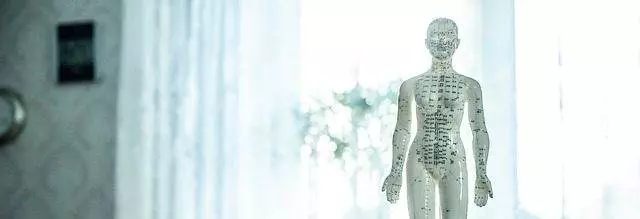
Do you ever feel your life’s a ride that won’t ever stop? How many nights do you wait for Mr. Sandman to magically appear? How often do you truly take time for yourself? Do you have aches and pains almost daily? Are over-the-counter or prescription medications controlling your life? When was the last time you actually felt at peace? If any of these questions resonate with you, then it might be time to look at Traditional Chinese Medicine and acupuncture for an answer. People in Asian countries have known the magnificence of acupuncture for thousands of years. Traditional Chinese Medicine is growing in popularity in the United States and here are some reasons why you might want to consider utilizing it also. continue reading
